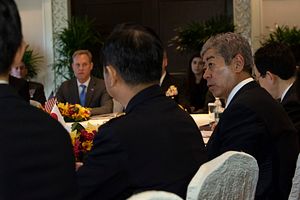The defense ministers of Japan and South Korea attempted to put aside their countries’ differences when they joined with their U.S. counterpart for a trilateral meeting focused on North Korea.
Bilateral relations between Tokyo and Seoul have been strained over a number of issues in the past year, including Japan’s allegations that a South Korean destroyer projected its tracking radar onto a Japanese Maritime Self-Defense Force maritime surveillance aircraft in December. The two sides have also been at odds over South Korean court rulings that Japanese companies must pay compensation to victims of wartime forced labor practices.
However, the United States and its two key allies in the region sought to project a sense of unity on security issues with the holding of the 12th Trilateral Defense Ministerial Meeting in Singapore on June 2. The meeting – held on the margins of the Shangri-La Dialogue – brought together Japanese Defense Minister Takeshi Iwaya, South Korean National Defense Minister Jeong Kyeong-doo, and U.S. Acting Defense Secretary Patrick Shanahan. At the beginning of the meeting, Jeong said he hoped the new Japanese imperial era of “Reiwa” marked a first step toward a new relationship between Tokyo and Seoul, the Mainichi newspaper reported.
According to a joint statement issued after the meeting, the three ministers “emphasized that trilateral and multilateral security cooperation led by the three countries plays an important role in maintaining peace and stability in the region.” They pledged to further their trilateral security cooperation, including by means of information sharing, high-level policy consultation, and combined exercises.
In the statement, the three ministers focused most extensively on North Korea. It is unsurprising that the three sides wanted to get on the same page, after apparent differences in public statements about North Korea’s recent weapons tests. Japan had previously accused North Korea of breaching United Nations Security Council resolutions by launching a short-range ballistic missile in May. However, U.S. President Donald Trump played down the significance of the weapons tests and dismissed the concerns of senior American officials who described them as a violation of UNSC resolutions. South Korea had also accused North Korea of violating the spirit of the military agreements between the two countries.
The joint statement said the ministers had “exchanged their views on the recent missile launches by North Korea, and confirmed that they would stay vigilant as defense authorities.” The statement did not, however, deal with the precise nature of those launches and whether they represented a breach of the UN Security Council resolutions.
The ministers “underscored the importance of the international community’s commitment to fully implement” those resolutions, including “sustained international cooperation to deter, disrupt, and ultimately eliminate North Korea’s illicit ship-to-ship transfers.” They said Tokyo, Seoul and Washington would “closely cooperate to support diplomatic efforts to establish complete denuclearization and permanent peace on the Korean Peninsula.”
The meeting follows a decision in May by Japanese Prime Minister Shinzo Abe to drop any preconditions for a summit with North Korean leader Kim Jong Un. There are no signs, however, that a Japan-North Korea summit is imminent.
At the trilateral meeting, the United States took the opportunity to reaffirm its “ironclad security commitments” to Japan and South Korea. The three ministers also reiterated the importance of a rules-based order and freedom of navigation and overflight, without naming China. The joint statement said all disputes should be resolved in a peaceful manner in accordance with the principles of international law. They further stressed the importance of defense-related confidence-building among countries in the region, and vowed to work toward institutionalizing such efforts.
Iwaya and Jeong also met bilaterally on June 1, the day before the trilateral meeting. Iwaya said he had asked for action to be taken to prevent a recurrence of the radar lock-on incident, according to a Kyodo News report. The Japanese defense minister added, however, that the two sides should focus on the future. Jeong also spoke of the need to improve bilateral relations and described the talks as “candid.”

































